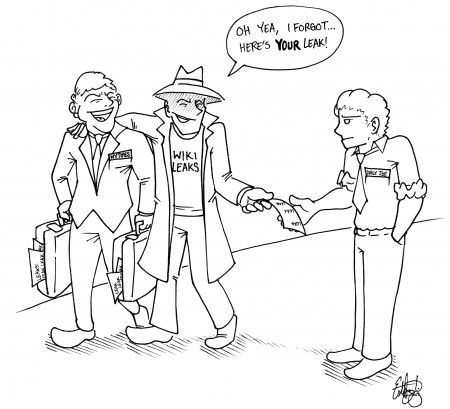It has been just two days since the first hundreds of more than a quarter of a million secret government documents concerning American diplomacy in numerous countries landed on the websites of global newspap
In the print edition of the Times on Monday, the paper began its series titled “State’s Secrets,” with four articles based on the confidential information the news outlet learned from State Department documents.
The articles detail that American diplomats are being required to conduct more intelligence gathering at their posts overseas, that many Arab nations were concerned with Iran’s nuclear weapons dealings and that the U.S. government strongly condemned the release of these documents to the public by WikiLeaks, a site devoted to broadcasting state secrets to the public.
WikiLeaks was responsible for the leak of 76,000 documents this summer regarding America’s progress in the war in Afghanistan.
The major release of secret documents by one of America’s most prominent newspapers has stirred ethical conversations in all circles — from journalists to the Times’ readers — and many are not happy with the paper’s decision.
On the Times’ website, editors are answering readers’ questions concerning its coverage of documents containing information that could cause much harm to Americans and strain international relations.
Readers have suggested that it is not the Times’ place to decide what confidential documents are OK for release and which should be redacted. “We elect leaders who, along with their trusted appointees and officials, analyze data and make such decisions. By subverting that process, The New York Times and WikiLeaks are undermining our entire electoral process,” one reader, Brian Chrisman, wrote to the Times.
The problem in this situation lies in the fact that the organization responsible for the documents’ release, WikiLeaks, is not a transparent organization despite its zeal for the freedom of information.
WikiLeaks receives funds from all over the world in ways that make its contributors anonymous.
Reported by The Wall Street Journal, the organization gets funds from Germany’s Wau Holland Foundation, where it has an account set up in its name. German law requires that those names are not released. But founder Julian Assange said that wasn’t the only way the organization gets its funds.
“We’re registered as a library in Australia, we’re registered as a foundation in France, we’re registered as a newspaper in Sweden,” Assange told the Journal. The organization also has two charitable organizations in the U.S., set up as 501C3s, that “act as a front” for WikiLeaks, Assange told the Journal.
The hypocrisy is astounding. The organization that looks to break the confidentiality of countries seeks protection within the privacy laws of those very countries.
However, what is more stunning is that while the Times received the summer documents directly from WikiLeaks, this time the Times received documents from The Guardian. Assange refused to give the Times the documents because of its coverage of WikiLeaks’ organizational and legal problems.
A news organization that works with a company with anonymous donors has crossed the line and entered unethical territory — a fact made apparent by Assange’s abandonment of the Times for its coverage.
The Times should not entangle itself within WikiLeaks’ hypocrisy. The whistleblower site may have endangered many lives and American ties, and if the Times continues to work with him in any manner other than for interviews, it is allowing the want for a breaking story to trump the necessity of a free press that acts ethically and with integrity.
If our national media continue on this trend, they are attempting to promote transparency all the while creating a convoluted, mysterious mess of the free press — a truth that could result in much more being hidden from the American people.
Keep Reading
Add A Comment


